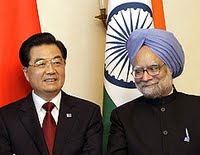While Afghanistan has often been touted as the crucible for the regeneration of the Western alliance, it also offers another opportunity for the United States: a means to promote a stabilizing modus vivendi between India and China.
In his recent WPR Briefing on China's stake in containing Pakistani militants, Michael Kugelman observed, "Pakistan's instability threatens the security of China's citizens, its government and its energy imports," particularly when it comes to the "combustible province of Baluchistan." He notes, "Whenever China has demanded something of Islamabad, the latter has often complied."
And in surveying the Indian strategic view of Afghanistan, Dan Twining, the senior fellow for Asia at the German Marshall Fund, cited K. Subrahmanyam, the dean of India's strategic community. Subrahmanyam believes that the only way the United States can meet the deadline President Barack Obama set in his West Point speech for putting Afghan security forces in the lead is to turn to New Delhi "to help train and equip Afghan security forces, just as India has been training Afghan civil servants, building roads, schools, hospitals, and other infrastructure as the country's fourth-largest bilateral donor."

